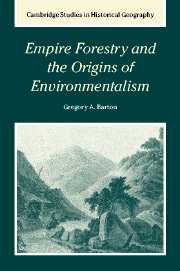Book contents
- Frontmatter
- Contents
- List of illustrations
- Acknowledgments
- 1 Introduction
- 2 The great interference
- 3 Empire forestry and British India
- 4 Environmental innovation in British India
- 5 Empire forestry and the colonies
- 6 Empire forestry and American environmentalism
- 7 From empire forestry to Commonwealth forestry
- Bibliography
- Index
- Cambridge Studies in Historical Geography
5 - Empire forestry and the colonies
Published online by Cambridge University Press: 13 July 2009
- Frontmatter
- Contents
- List of illustrations
- Acknowledgments
- 1 Introduction
- 2 The great interference
- 3 Empire forestry and British India
- 4 Environmental innovation in British India
- 5 Empire forestry and the colonies
- 6 Empire forestry and American environmentalism
- 7 From empire forestry to Commonwealth forestry
- Bibliography
- Index
- Cambridge Studies in Historical Geography
Summary
The export of forestry ideals and methods from India to the other British colonies is surprising because India, though the most prized of the colonies outside the self-governing dominions, did not host the central institutions that provided the expertise for the empire. Britain clearly filled this role. But because most of Britain's own forests were in private and not state hands, because an abundance of coal had replaced timber, and because, paradoxically, Britain relied on its own colonies to supply such raw materials as timber, Britain did not develop its own state-sponsored forestry program until after the Second World War.
The other colonies looked to Indian foresters for inspiration and expertise because India, under Dalhousie's Forest Charter, was the first to develop and expand state forestry programs. Also, certain issues had sharpened the interest of colonial administrators and their publics in Indian forestry innovations. Some of these issues, which have been already discussed, included a growing interest in the link between climate and deforestation. Timber shortages throughout the empire increased speculation that the supply would soon run out.
The factors that led India to adopt a full-scale environmental program, with the reservation of forest areas, also affected other sectors of the British colonies, including South Africa, Australia, New Zealand, and Canada. “To India,” R. S. Troup lectured forestry students in the 1930s, “belongs the credit of having been the first part of the empire to adopt a rational policy of forest conservation and development.”
- Type
- Chapter
- Information
- Empire Forestry and the Origins of Environmentalism , pp. 94 - 129Publisher: Cambridge University PressPrint publication year: 2002



